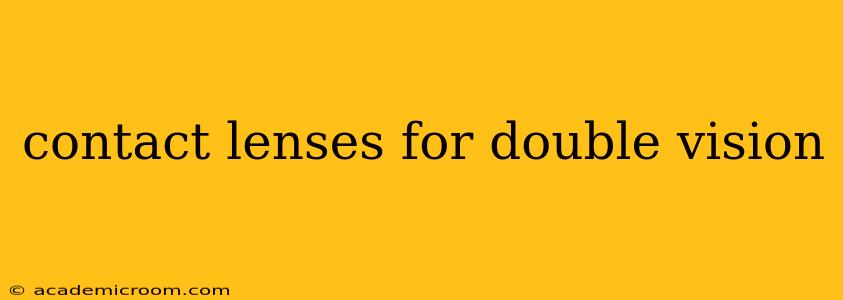Double vision, or diplopia, is a frustrating condition where you see two images of a single object. While it can stem from various causes, including muscle imbalances, neurological issues, or even certain medications, it significantly impacts daily life. Many people wonder if contact lenses can help correct double vision. The answer isn't a simple yes or no, and understanding the nuances is crucial. This comprehensive guide explores the role of contact lenses in managing double vision and answers frequently asked questions.
Can Contact Lenses Correct Double Vision?
Contact lenses alone cannot correct double vision in most cases. Double vision arises from misalignment of the eyes (strabismus) or problems with the eye muscles' coordination. While glasses can sometimes help by correcting refractive errors that might contribute to or worsen the symptoms, contact lenses primarily address refractive errors (nearsightedness, farsightedness, astigmatism). They don't directly treat the underlying cause of the misalignment responsible for double vision.
What are the Causes of Double Vision?
Understanding the root cause of your double vision is paramount before considering any treatment options, including contact lenses. Several factors can contribute to this condition:
- Strabismus: This refers to misalignment of the eyes, where one eye points in a different direction than the other. It can be present from birth (congenital) or develop later in life.
- Muscle Imbalances: Weakness or paralysis of the eye muscles can lead to double vision. This can be caused by neurological conditions, strokes, head injuries, or certain diseases.
- Neurological Conditions: Conditions affecting the nerves controlling eye muscles, such as multiple sclerosis or myasthenia gravis, can also cause double vision.
- Eye Injuries or Infections: Trauma or infections impacting the eye's structures can lead to temporary or persistent double vision.
- Medications: Certain medications, particularly those affecting the nervous system, can have double vision as a side effect.
What type of eye doctor should I see for double vision?
An ophthalmologist is the best specialist to see for double vision. They're medical doctors specializing in eye care and can diagnose the underlying cause of your double vision. They'll be able to perform a thorough eye exam and recommend the appropriate treatment. An optometrist can also provide an eye exam, but for complex cases like double vision, an ophthalmologist's expertise is often needed.
Can contact lenses help with the symptoms of double vision?
While contact lenses won't cure double vision, they might alleviate some symptoms in specific circumstances. If the double vision is partly due to an uncorrected refractive error (like nearsightedness or astigmatism), contact lenses can improve visual clarity. This could make the double vision less bothersome, but it won't resolve the underlying eye muscle issue.
What are the treatment options for double vision?
Treatment for double vision focuses on addressing the underlying cause. Options may include:
- Eye Muscle Surgery: This is often the treatment for strabismus, correcting the misalignment of the eyes.
- Prism Glasses: Prisms in eyeglasses can help bend the light entering the eyes, allowing the brain to fuse the two images into one. This doesn't correct the eye misalignment but offers symptomatic relief. Similar prism correction might be possible with specialized contact lenses in limited cases.
- Medication: Depending on the cause (e.g., inflammation, neurological conditions), medication may be prescribed to alleviate symptoms or treat the underlying condition.
- Vision Therapy: This involves exercises and training to improve eye muscle coordination and reduce double vision.
Are there special contact lenses for double vision?
There aren't specific "double vision" contact lenses. However, in rare cases, an ophthalmologist might prescribe contact lenses with prisms to help alleviate the symptoms. This is less common than using prism glasses for double vision relief.
When should I see a doctor about double vision?
Double vision is a symptom that warrants immediate medical attention. If you experience double vision, especially if it's sudden or accompanied by other symptoms like headaches, dizziness, or loss of vision, schedule an appointment with an ophthalmologist as soon as possible. Early diagnosis and treatment are key to preventing lasting complications.
Disclaimer: This information is for general knowledge and does not constitute medical advice. Always consult with a qualified ophthalmologist for diagnosis and treatment of double vision or any eye condition.
